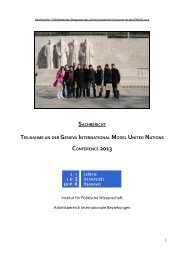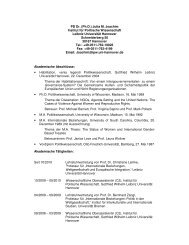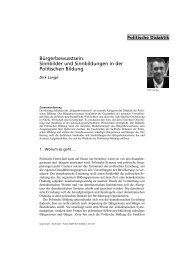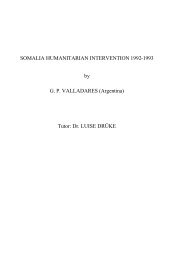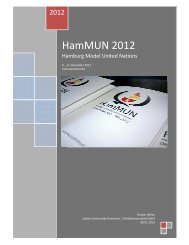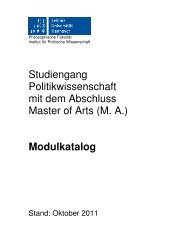Preventive Action for Refugee Producing Situations
Preventive Action for Refugee Producing Situations
Preventive Action for Refugee Producing Situations
You also want an ePaper? Increase the reach of your titles
YUMPU automatically turns print PDFs into web optimized ePapers that Google loves.
194 Chapter 5<br />
spring, the objection against international intervention on the basis of domestic<br />
jurisdiction often has a political connotation. Except <strong>for</strong> natural disasters, when<br />
people flee <strong>for</strong> nonpolitical reasons, a state tends to react aggressively to<br />
reminders about the fundamental humanitarian principle of respecting their own<br />
nationals' rights, especially in volatile and tense internal situations. States<br />
generally have been wary of signing international treaties, such as the<br />
convention on territorial asylum, that would cut into their domestic<br />
jurisdiction. 446 Also, during the implementation of binding international and<br />
regional human rights instruments, when en<strong>for</strong>cement of humanitarian minimal<br />
standards would be most urgently required, states often override<br />
constitutionally guaranteed fundamental freedoms by invoking exceptional<br />
decisions, thus derogating from what should be nonderogable principles. States,<br />
especially authoritarian ones, tend to fend off outside intervention under the<br />
rationale of domestic jurisdiction, while "legalizing" actions against their<br />
citizens with arbitrary administrative decrees restricting their rights. 447<br />
5.2. Rebuttal of states'objections<br />
In the past, states have been able to get away with the argument that what they<br />
do within their own borders is their own's business. There was a lingering<br />
power to the concept in international law that a nation's boundaries are<br />
sacrosanct. International acquiescence to this reasoning has, in part, enabled<br />
such horrors to take place as the Armenian genocide under the Turks, the<br />
killing of some 10 million Russians in the early 1930s under Stalin, the<br />
Holocaust under Hitler, the genocide under Pol Pot and Idi Amin, and the<br />
current slaughter of the Ba'hai people in Iran.<br />
___________________________<br />
446 "Mention has to be made, however, of the fact that Europe disposes of the very<br />
effective instruments <strong>for</strong> the judicial en<strong>for</strong>cement of the obligations arising out of<br />
the European Convention on Human Rights and of treaties establishing the European<br />
Communities." T. Stein, "Regional En<strong>for</strong>cement of International<br />
Obligations," Zeitschrift für ausländisches und öffentliches Recht und Völkerrecht,<br />
(ZaoRV), 47 No. l (1987), p. 111.<br />
447 Chile is one such example. By virtue of the transitory Art. 24 of the 1980 Constitution,<br />
in situations of pertubation of the internal peace and security, the President<br />
may expel or prohibit the return of Chilean nationals, detain people <strong>for</strong> five days,<br />
or send people into internal exile within the territory. See "In<strong>for</strong>me sobre la situaciön<br />
de los derechos humanos en Chile," Report by the Interamerican Commission<br />
of Human Rights of the Organization of American States, OEA/SER.<br />
L/V/II.66, doc. 17,27 September 1985, pp. 41-42.<br />
Legal Justification 195<br />
In view of the shocking cruelties humanity has witnessed, it is imperative to<br />
reorient priorities, and put "basic human rights above any absolute notion of<br />
border impermeability." 448<br />
To begin with, the domestic jurisdiction argument might be rebutted with<br />
the fundamental question: Are "human rights" and "fundamental freedoms,"<br />
referred to in the UN Charter, matters essentially within domestic juris diction?<br />
The answer must be no.<br />
It is the consensus of judicial opinion that there is no matter which by its very nature is<br />
essentially within the domestic jurisdiction of States or which cannot be regulated by a<br />
general or individual norm of international law. A matter is, there<strong>for</strong>e, within the domestic<br />
jurisdiction of a State only if there exists no general or individual rule of international<br />
law which governs it. 44 '<br />
Even though the terms "human rights" and "fundamental freedoms" might<br />
mean different things to different people, which might contribute to a<br />
weakening of the legal <strong>for</strong>ce of obligation, these concepts are considered by the<br />
United Nations created specific obligations regarding at least minimal<br />
humanitarian standards. If states still object on the grounds of domestic<br />
jurisdiction, then we might recall that member states, by virtue of joining the<br />
world organization have also accepted an obligation to cooperate with the<br />
United Nations in achieving its purpose of maintaining international peace and<br />
security. If international peace and security are threatened in a conflict in which<br />
large numbers of human lives are in danger, states are required to cooperate<br />
with the Secretary-General in his ef<strong>for</strong>ts to save human lives. 450 The guiding<br />
thought should<br />
___________________________<br />
448 See Fernando R. Teson, Humanitarian Intervention: An Inquiry Into Law And<br />
Morality, p. ix.<br />
449 Morrison, Benni Sue, "International Organizations and Human Rights:<br />
Reconciling the Protection of Human Rights with Contemporary World Order,"<br />
diss. New York University 1981, pp. 51-52.<br />
450 The representative of Algeria, in referring to groups of people being executed in<br />
Ethiopia, stated in the 2301st Plenary meeting of the UN General Assembly that<br />
the General Assembly would wish both the Secretary-General and the President of<br />
the General Assembly to do all they can to save human lives in danger. His interpretation<br />
that in the minds of members of the General Assembly, "collectively and<br />
individually, the action does not in any way represent interference in the domestic<br />
affairs of a Member State" was not objected to. See Ramcharan, Humanitarian<br />
Good Offices in International Law, 1983, pp. 172-173




